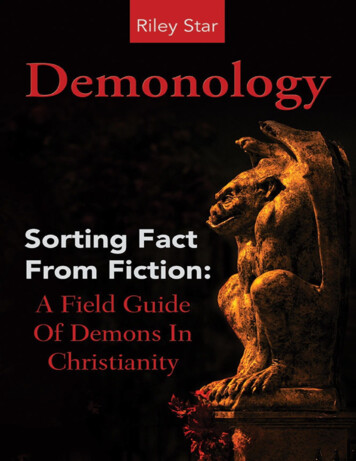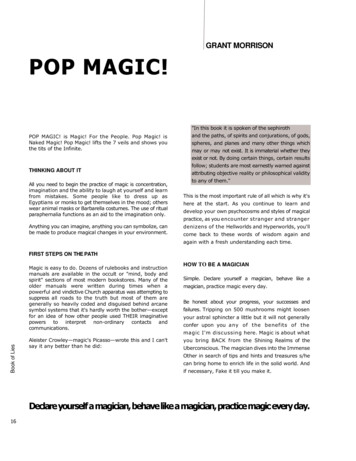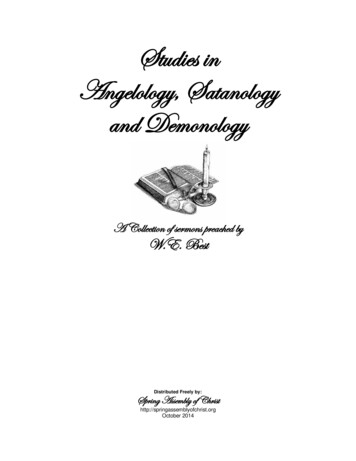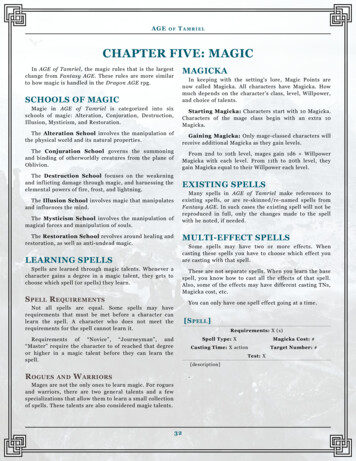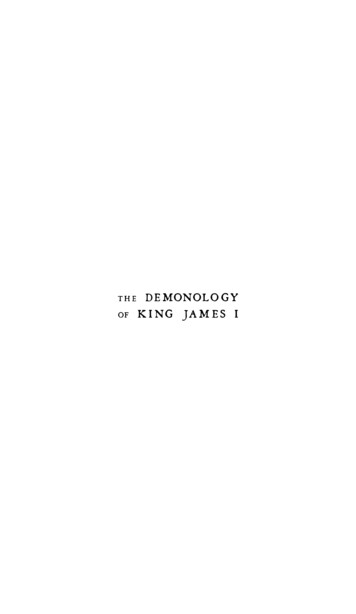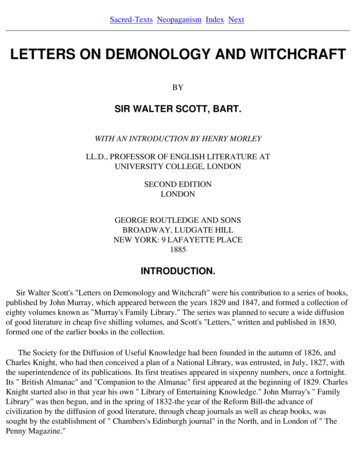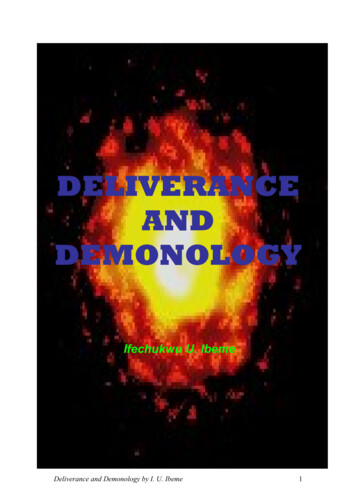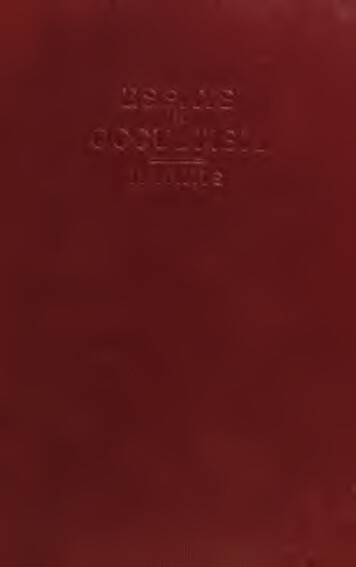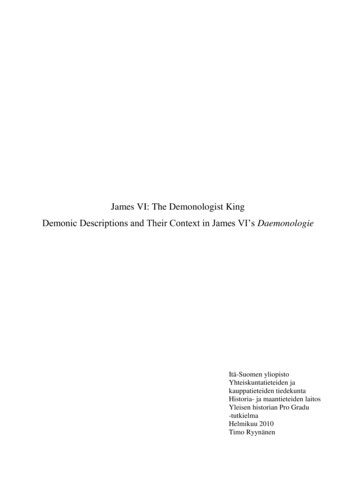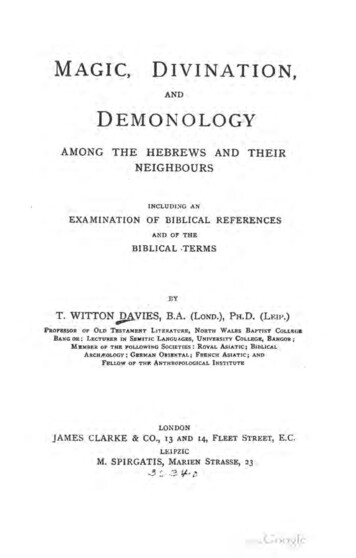
Transcription
MAGIC,DIVINATION,ANDDEMONOLOGYAMONG THE HEBREWS AND THEIRNEIGHBOURSINCLUDING ANEXAMINATION OF BIBLICAL REFERENCESAND OF THEBIBLICAL .TERMSBYT. WITTON VIES, B.A. (LoND.), PH.D. (LEIP.)PROFESSOR oP OLD TESTAMENT LITERATURE, NoRTH WALES BAPTIST CoLLEGEBANG OR ; LECTURER IN SEMITIC LANGUAGES, UNIVERSITY COLLEGE, BANGOR;MEMBER OF THE FOLLOWING SOCIETIES ; ROYAL ASIATic; BIBLICALARCHA!OLOGY ; GaRMAN ORIENTAL; FRENCH AstATtc; ANDFELLOW OF THP. ANTHROPOLOGICAL INSTITUTELONDONJAMES CLARKE& CO., 13 AND 14, FLEET STREET, E.C.LEIPZICM. SPIRGATIS, MARIEN STRASSE,23.3 : . .?. If· to; 9 1t1zed byCoogle
v -;:;As.s: r'M ,. . Dr1c., 1Q Frea . Lv IJ19131LONDONPRINTED BY GILBERT AND RIVINGTON1 LTD.ST. JOHN'S HOUiB, CLBRKBNWELL, B.C.o; 9 1t1zed byCoogle
,·DEDICATEDTOMY WIFEWITH AFFECTION AND GRATITUDBDigitiZed byCoogle
·:··· :·o; 11.t,zed byCoogle
PREFACETHIS treatise was presented to the University ofLeipzig, July, 1897, acc rding to the rule requiringsuch a dissertation to be presented and accepted beforethe candidate is allowed to proceed to the examinations prescribed for the degree of Doctor of Philosophyin the University. The dissertation has to be printedand 200 copies presented to the University withinone year from the time when the final examinationwas passed. The limits of time and of space, andthe need that the dissertation should be prir.tedessentially as it was accepted by the Philosophicalfaculty of the University, made it impossible tointroduce much change. Since writing it, however,I have read and thought a great deal about thesubjects with which my dissertation deals ; someslight results of that will be seen in the correction ofmy MS. as well as in references to books newlypublished. Further results-results too, I hope, ofcontinued reading and reflection-may show themselves at a future time.o; 9 1t1zed byCoogle
viiiPREFACEThe "Vita" or " Life " is left at the end, as it hadto be printed in the copies sent to the University.I will not close this preface without warmlyacknowledging the uniform courtesy and kindnessreceived from the Professors of the celebratedUniversity of Leipzig whose classes I joined. Iwould like especially to acknowledge my indebtedness to Prof. Socin, one of the greatest livingteachers of Arabic. Dr. Dillman, of Berlin, andDr. Socin, of Leipzig, were teachers at least as greatas any I have known, and I am thankful to an everkind Providence to have been able to benefit fromtheir instruction, and from their example of industryand thoroughness.T. WITTON DAVIES.MIDLAND BAPTIST CoLLEGE,}UNIVERSITY CoLLEGE,Aug.12,NoTTINGHAM.1898.Dig itized byCoogle
CONTENTSPAGExiLITERATUREINTRODUCI'ION Definition of MagicMagicians a classBlack and White Magic, Conjuring, Natural Magic .Magic, wide and narrow sense ofSome terms explained Divination briefly defined and describedNecromancyDemonologyCommon origin of the precedingMagic without Animism or SupernaturalismSympathetic MagicMagic and ReligionMagic and ScienceMagic and Divination.Magic and DemonologyI . MAGIC 2345667816171825272830Traces and Survivals in the Old TestamentBiblical TermsOld Testament TermsOld Testament Words for Magic or in Relation to it.Magic in the New TestamentMagic in Post-Biblical Judaism .Magic among Arabs and MoslemsAssyrian MagicIllegal MagicLegal MagicEgyptian Magic .o; 9 1t1zed by30404144596I6367686970Coogle
XCONTENTSPAGE.II. DIVINATION72Fuller Definition and DescriptionDivination and Biblical ProphecyMethods of Divination referred to in the Old TestamentHebrew terms used in connection with DivinationBiblical Necromancy and terms forDivination in Post-Biblical Judaism .Divination among the ArabsMOdes of Divining among the Arabs .PresagesIslAm and Divination .Babylonian and Assyrian DivinationEgyptian DivinationIII. DEMONOLOGY7Z737478859090929292939495Demonology in the Old Testament : Traces andSurvivals95Demonology in the Apocrypha IooDemonology in the New Testament102AntichristIo6Demonology of Josephus107Demonology of the Pseudepigraphical Writings108Demonology in Post-Biblical Judaism109Countercharms .II2Sources of Jewish Magic and Demonology114Demonology among the Arabs and MoslemsI 19Countercharms ·I25Assyrian Demonology.125Countercharms .127Egyptian Demonology128Countercharms .128Phrenician and Syrian Magic and Demonology .129Dig itized byCoogle
BOOKS AND EDITIONS CONSULTED ORREFERRED TO (WITH ABBREVIATIONS)D'Alviella. (Hibbert) Lectures on the Origin and Growth ofthe Conception of God. London, 1892.Anz. Zur Frage nacb dem Ursprunge des GnostizismusWilhelm Anz. Leipzig, 18 .Baudissen. Studien zur semitischen Religionsgeschichte vonWolf Wilhelm Grafen Baudissen. Leipzig, 1876 and1878. 2 vols.Bochartus, Sam. Hierozoicon. Editio Tertire. Lugd. et Traj.1682.· Bousset. ifhe Antichrist Legend. By W. Bousset. Translated by A. H. Keane. London, 1896.Brecher. Das transcendentale Magie und magische Heilartenim Talmud. Wien, 185o.Brewster. Letters on Natural Magic. By Sir David Brewster,K.H., &c. London, 5th edition, 1842.Brinton. Religions of Primitive Peoples. By D. G. Brinton,LL.D., &c. London and New York, 1897.Burton. Anatomy of Melancholy. By Henry Burton. London,1861.Caird. The Evolution of Religion. Gifford Lectures. ByEdward Caird. 2 vols. Glasgow, 1893.Caird J. An Introduction to the Philosophy of Religion. ByJohn Caird. Glasgow, 188o.Caldwell. Dravidian Grammar. By Bishop Caldwell. (Page518 ff. Demonology among the Dravidians.)o; 9 1t1zed byCoogle
xiiLITERATURECharles. The Book of Enoch. By R. H. Charles. Oxford,1893·Crook. Folk-lore of Northern India. By W. Crook. 2 vols.2nd ed. London, 18«}6.Delitzsch, Fried. Prolegomena, &c. Von Dr. Fried. Delitzsch.Leipzig, 1886.Delitzsch, Franz (father). Various Commentaries and Articlesin Dictionaries.Dennys. The Folk-lore of China. By B. N. Dennys.London, 1876.Doughty. Travels in Arabia Deserta. 2 vols. By C. M.Doughty. Cambridge, 1888.Edersheim. Life and Times of the Messiah. By AlfredEdersheim. London, 1888.Eisenmenger. Entdectes Judenthum. 2 vols. By]. A. Eisenmenger. Konigsberg, 1711 1 1714Ency. Brit. Encyclopa!dia Britannica. 9th edition.Ennemoser. The History of Magic. By Joseph Ennemoser.Englished by Wm. Howitt. 2 vols. London, t8S4·Ewald. Die Lehreder Bibel von Gott. 4 vols. Leipzig, 1871-76.Findlay. The Epistles to the Thessalonians, with Introduction, Notes, &c. By Rev. G. G. Findlay, M.A.Cambridge, 1896.Frazer. The Golden Bough. A Study in ComparativeReligion. By ] . G. Frazer. 2 vols. London, I890Freytag. Einleitung in das Studium der arabischen Sprache.Von G. W. Freytag. Bonn, 1861.Gesenius. 1. Thesaurus.2. Lexicon. nth edition. Buhl.3· Hebriiische Grammatik. 26te Ausgabe. (Kautsch.)Leipzig, 18 . (An English Translation published byClarendon Press at I u . has just made its appearance. Why not at a price which students might beexpected to afford ? The German edition cost mebound, with discount, about ss. 8d., and the Englisho; 9 1t1zed byCoogle
xiiiLITERATUREedition includes no more, though it is better printed andalso bound.)Ginsburg. The Kabbalah. London, 1865.Goldziher. Abhandlungen zur arabischen Philologie. VonIgnaz Goldziher: erste Theil. Leiden, 18 .Granger. The Worship of the Romans. By F. Granger,D.Lit. London, 1895.Grant. The Mysteries of all Nations. By Jas. Grant. Leith,188o.Grimm. Teutonic Mythology. By Jacob Grimm. 4 vols.(Continuous paging.) English translation. By J. S.Stallybrass. London, 188z-1888.Hegel. Vorlesungen tiber die Philosophie der Religion. zteAusgabe. Berlin, 1840.Herzog 1 Real Encyclopidie. By Herzog, &c. 1st and zndHerzog'editions respectively.Hillebrandt. Ritualliteratur. Vedische Opfer und Zauber.Strassburg, 1897.Horst. Zauberbibliothek : 6 Theile von G. C. Horst. Mainz.JJ8ZJ-J8z6.Hughes. Dictionary of Islam. By. T. P. Hughes. London,1885.J ahn. Der Aberglaube des bi:isen Blicks bei den Alten.Abhand. der sachs. Academ. der Wissenschaft.1855·Jevons. An introduction to the History of Religion. ByFrank Byrom Jevons. London, 18 .Joel. Der Aberglaube und die Stellung des Judensthums zudemselben. Von Rabbi David Joel. Parts 1 and z.Breslau, 1881 and 1883.josephus, Works of. English Translation by Whiston.King. Babylonian Magic and Sorcery, being the "prayers ofthe lifting up of the hands." By L. King. London,18 .o; 9 1t1zed byCoogle
xivLITERATUREKohut. Jiidische Angel. u. Diimonologie. Von A. Kohut.Leipzig, x866.Lane. The Thousand and One Nights. By E. W. Lane.3 vols. London, 1839.Lang. 1. Myth, Ritual and Religion. By Andrew Lang.2 vols. London, 1887.2. Custom and M'th. By Andrew Lang. London, 1897.3· The Making of Religion. By Andrew Lang. London,1898.Lenormant.1.Chaldean Magic. By F. Lenormant.London,1877.z. Divination, et Ia science des presages. Par F. Lenormant. Paris, 1875·Levy. Neu hebriiisches u. chaldiiisches Worterbuch. VonProf. Dr. Jacob Levy. 4 vols. Leipzig, 1876 to 1889.Lyall. Asiatic Studies, Religious and Social. By Sir AlfredC. Lyall, K.C.B., C.I.E. London, 1882.Meiners. Geschichte aller Religionen. By Prof. Meiners.2 vols. 18o6.Michaelis, J. D. Commentaries on the Laws of Moses. Fromthe German. 4 vols. London, 1814.Mtihlau. De Prov. Aguri et Lemuelis. Leip. 1869.Nevius. Demon Possession and Allied Themes. By J. L.Nevius. London, 181)6.N. T. New Testament.0. T. Old Testament.Prym and Socin. Der neu-Aramiiische Dialect des Tur'Abdin.Von Eugen Prym u. Albert Socin.Text u. Ubersetzung. Zwei theile. Gottingen, 1881.Renan, Ernest. History of the People of Israel.London, 1888--1891.3 vols.Riehm. Riehm's Handworterbuch des Biblischen Alterthums.2nd edition, 1894.o; 9 1t1zed byCoogle
LITERATUREXVRoskoff. Geschichte des Teufels von Gustav Roskoff. 2 Bde.Leipzig, 1869.Schorr. f-! niT Wissenschaftliche Abhandlungen tiber JUdische Geschichte, Litteratur u. Alterthum. Frankfort a.Maine, 1865. Heft. vii., 1872, Heft. viii.T :Scholz. Gotzendienst u. Zauberwesen bei den alten Hebrii.em.By Dr. Paul Scholz. Regensburg, 1877.Schultz. Biblical Theology of the Old Testament. By H.Schultz. 2 vols. Edinburgh, 1893.Schenkel. Bibei-Lexicon. By Dr. D. Schenkel, and others.Schrader. Die Keilinscheiften u. d. alte Testament. Giessen.:md ed., 1883.Scott. The Existence of Evil Spirits. By (Rev.) Walter Scott.London, 1853. (Not Sir Walter Scott, the celebratednovelist, who wrote a book on Witchcraft, &c.)Smend. Lehrbuch der altestamentlichen Religionsgeschicbte.Freibourg u. Leipzig, 1893.Smith, W. Bible Dictionary. 2nd ed., 1894.Smith, W. R. 1. Journal of Philology, xiii. pp. 273-288;xiv. pp. 113-128.2. The Religion of the Semites. By W. Robertson Smith.Edinburgh, 1889.Spencer. De Legibus Hebrreorum ritualibus earumque rationibus. 2 vols. Tubingre, 1732. ed. C. M. Pfaff.Socin. Guide to Palestine. Baedeker's.Stade. Geschichte des Volkes Israel. Von Dr. B. Stade,Berlin. 2 vols., 1887-88.Streane. A Translation of the Treatise Chagigah from theBabylonian Talmud. By Rev. A. W. Streane, M.A.Cambridge, 1891.Tallqvist. Die Assyrische Beschworungserie Maqlu, &c. VonKnut L. Tallqvist. (In Acta Societatis ScientiarumFennicre Tomus xx., 1895.)o; 9 1t1zed byCoogle
xviLITERATURETiele.Gescbichte der Religion im Altertbum. Von C. P.Tiele. 1 Band. Gotha, 18 )6.Tylor. Primitive Culture. 2 \'Ols. 3rd ed. 1891.Torreblanca. De Magia. Editio Novissima. Lugduni, 1678.Tuch. Commentar iiber die Genesis. 2te Auflage, 1871.Waite. The Occult Sciences. By Arthur Ed. Waite. London,1891.Weber. Jiidische Theologie. Von Dr. Terd. Weber. Zweiteverbesserte Auflage. Leipzig, 1897.Wellbausen. 1. Reste arabische Heiderstums. 2te Auflage.Berlin, 1897. 2. Isr. u. Jiid. Geschichte, 189;. 3· DieKleinen Propheten, 1892.Wiedemann. Religion of the Ancient Egyptians. By AlfredWiedeman, Ph.D. London, 1897.Winer, iii. Biblisches Realworterbuch. Von Dr. G. B. Winer,&c. Dritte Ausgabe, 1840.Z. A. W. Zeitschrift flir die Alttestamentliche Wissenschaft.Stade.Z. D. M. G. Zeitschrift der Deut. Morgen!. Gesellschaft.Zimmem. Die Bescbworungstafeln Surpu. Leipzig, 18 )6.(Beitriige zur Kenntniss der Babyloniscben Religion.Von Dr. Heinrich Zimmern. 1te Lieferung.)o; 9 1t1zed byCoogle
MAGIC, DIVINATION, ANDDEMONOLOGYINTRODUCTION.MAGIC, Divination, Necromancy, and Demonology are soclosely connected in their character and history, that itis impossible to lay down lines between them which arefixed and exclusive.First of all, let each be defined as clearly as may be.DEFINITION OF MAGIC.Magic may be briefly defined as the attempt on man'spart to have intercourse with spiritual and supernaturalbeings, and to influence them for his benefit. It restsupon the belief so prevalent in low civilizations, that thepowers in the world on which human well-being dependsare controlled by spiritual agents, and that these agentsare to be conciliated and made friends of by words, acts,and so forth, which are thought to please them. Thereis in this something analogous to religious worship andprayer. Indeed, magic and religion have many and closeaffinities, as will be more fully shown. 1 All magic islSee "Magic and Religion," p. 18.Bo; 9 1t1zed byCoogle
2MAGIC 1 DIVINATION, AND DEMONOLOGYincipient religion, for it is an appeal to spirits believed tobe more powerful and wise than man, and the methodsemployed to secure what is desired are no other thansupplications to the goodwill of the beings consulted.Magic may be described as a tow kind of religion inwhich the ethical element is either subordinated or sacrificed to other and inferior elements. Incantations areprayers, only that the main stress is laid on the mode ofutterance rat.h er than on the moral condition of theagent. Plants, drugs, etc., when burnt to appease thegood spirits, and protect against evil ones, are to becompared with sacrifices, and especially with incense,which last obtains at the present time in many branchesof the Christian Church. In the mythology of the Vedasit is hard, if not impossible, to distinguish betweenmagical acts and sacrifices ; in each case something isdone with the view of propitiating higher beings.1The unethical means employed by magic correspondto the unethical view that is held of the beings traffickedwith. As the conception of these beings rises, animism' .passes through polytheism on to monotheism. At thislast stage the one God believed in is just and holy,requiring on the part of all who have to do with Himmoral qualifications, these above all else, these almostto the exclusion of all other qualifications. Magic hasnow given way to religion. Prayer and fellowship havetaken the place of mere words and acts.MAGICIANS A CLASS.Hegel has very correctly pointed outs that wheremagic is believed in, not everyone is able or allowed to1Hillebrandt, p. 167 f.1' See this term explained at p. 8 f.i. p. 28r.o; 9 1t1zed byCoogle
.[@Ail.INTRODUCTION3practise it. Special individuals are chosen on account oftheir superior knowledge of the formulre, methods ofoperation, etc., believed to prevail with the powers whichit is sought to persuade. This select body of mencorresponds to the priests, which in the lower forms ofreligion are credited with extraordinary knowledge ofDivine secrets, and with unusual influence over Deity.Indeed, it is hard to say when exactly the magicianresigns, and the priest enters upon office. To someextent the conception and conduct which properly belongto magic, accompany religion in all its historicalforms.1Magic has been made to consist especially in the art otcompelling spirits or deities, or the Deity, to do the willof him who utters the needful words, or performs therequisite acts. In this it has been made to stand apartfrom religion, as by d'Alviella,s and Professor E. Caird!So also apparently Hegel, but cf. p. 23 ff., "Religion andMagic." This, however, is not strictly correct, because,as already stated, all magic is a sort of religion; andcertainly in most cases, the magician does not seek touse force in the exercise of his art : else what do wemake of incantations and charms ?BLACK AND WijiTE MAGIC, CONJURING, NATURALMAGIC.In the lowest stages of culture the spirits communicatedwith are not separated into good and bad, just becausethe categories of good and bad have not risen intoconscious thought, though implied in the very earliestthinking. Later on, traffic with evil spirits, particularlySee ;,.,., P 24·1See p. 87 &'.Ii. P· 225·4i. p. 281.o; 9 1t1zed byCoogle.1I
4WAGIC 1 DIVINATION, AND DEMONOLOGYwhen the purpose was to injure others, was called BladeMagi(, or the Blade Art. Wllite Magi(, the contraryterm, stood for intercourse with well-disposed spirits.In our own time, and amongst civilized peoples, WhiteMagic means no more than the art of performing clevertricks with the hands, etc. Similarly the word (onjurehas, in modern English, the present meaning whichWhite Magic has among ourselves, though originally itdenotes exorcise. A (onjurer-well, children know whohe is, perhaps even better than their soberer sires.Sir David Brewster's interesting little book on " NaturalMagic" gives an account of the way in which anacquaintance with the secrets of nature and of art havebeen used to support claims of being on intimate termswith the spiritual world. But the expression "NaturalMagic" was used in this very same sense long before SirDavid's time. Even Lord Bacon, in his " Advancementof Learning," has it with this signification.MAGIC, WIDE AND NARROW SENSE OP.In a narrow, but later sense, magic has to do withfeats of power and not of knowledge. For this reasonthe relation between magic and divination has beencompared to that existing between miracles andprophecy. But it will be more fully shown later onthat at the beginning, and at the present among backward races, this distinction is not drawn. Indeed,divination is hardly the right word to use for what isso called at this stage, since it is really magic applied tofuture events. The future is not so much foretold asconstituted, or made, by the art of the magician.1See infra, p. 27.
sINTRODUCTIONSoME TERMS EXPLAINED.The German word zaubern has been var:iously explained, but the etymology having the best support. isthat which connects it with the Gothic la11jan, Old HighGerman zouwan ( the modern German lltun. Cf. EnglishdoM). All these words mean to lk, magic, relating tofeats of power (a later and narrower sense, however, seebefore). Compare with these terms the Middle Lat!n{aclura, the Italianfatlura, the Portuguesefti/igo (fetish),the Spanish lteclto, all meaning primarily somethingdone, and secondarily magic. It was Grimm (Jacob)who first suggested the above derivation of the Germanword.The English word magic is, in our language, primarilya noun, but it represents an adjective in the classicaltongue, the corresponding noun for art being understood, and sometimes expressed in Latin (Ars Magica)and in Greek (p.ayuoi .,.(xvq). The noun from whichthe classical adjective is derived is pa:yo ;1 plural p.O.yot.,the priestly caste among the Medes, Persians and Parthians. The root mag has been connected with the IndoEuropean root maka,I great, but without the slightestground. Nor is it the Persian or Zend word denotingwise in divine things,' wise, excellent, priest.' Theword came over as the thing it stood for did, from theAccadians to the Babylonians and Persians. Lenormantf traces the word to the Accadian imga, whichmeans "respected," "honoured." Schrader 6 translatesthe word by liifanddcktig (very devout), or liifgelekrl (verylearned), adopting the same etymology.4Cf. Lat. magnus; Welsh, mMIIr (from Lat. majar).1 Waite, p. n .Porphyr., de Abstinentii, 4, 16."Chaldean Magic." p. 257·o; 9 1t1zed byCoogle
6IIAGIC1 DIVINATION, AND DEMONOLOGYDIVINATIONDivination may be provisionally defined 1 as the attempton man's part to obtain from the spiritual world supernormal t or superhuman knowledge. This knowledgerelates for the most part to the future, but it may alsohave to do with things in the present? such as wheresome hidden treasure is to be found. Divination takesfor granted the primitive belief that spiritual beingsexist, are approachable by man, have means of knowledge which man has not, and are willing upon certainconditions known to diviners to communicate the specialknowledge which they are believed to possess.When, as among the Israelites, divination co-existedwith monotheism, or at any rate with monolatry, to useStade's word,5 the modes of divination were but methodsof consulting deity. The Old Testament prophet, undersuch circumstances, differs from the diviner mainly inthis, that he makes his appeal direct to God, withoutthe employment of such means as heathen soothsayersused, which means are referred to in the Old Testamentand often with approval. But both diviner and prophetmight, and indeed actually did, believe in Yahwe : bothalso sought guidance from Him.NECROMANCY.Necromancy is a part of divination and not a thingdistinct in itself. Its peculiar mark is, that the information desired is sought from the ghosts of deceasedpersons. Divination embraces all attempts to obtain121See a fuller treatment of the subject at p. 72 fr.Andrew Lang's word in his new book, "The Making of Religion."4 See infra, p. 74 If.i. p. 429.o; 9 1t1zed by Coogle-··· ---
INTRODUCTIONsecret knowledge from the denizens of the spiritualworld, so that necromancy comes under it, and is a partof it. Indeed, the word itself denotes literally divination(p.ai'T'cla) by consulting the dead (vc epo :).DEMONOLOGY.The etymology of the word demonology is no safeguide as to what the word itself means, for the Greek8a{p.""' denotes a supernatural being that stands midwayHe may be good or bad.between gods and men.Lecky says : 1 " A dcemon in the philosophy of Plato,though inferior to a deity, was not an evil spirit, and it .is extremely doubtful whether the existence of evildremons was known to the Greeks or Romans till aboutthe time of the advent of Christ."We commonly understand by demonology the beliefwhich is a part of advanced animism 2-that there existevil spirits which are more or less responsible for themisfortunes which assail men. In the earliest stage itis probable that good and evil spirits were not distinguished. Men must from the very first have noticed inthemselves and in others, dispositions and tendenciesas revealed in conduct. Some men would be characterized as prevailingly good, others as prevailingly bad. Iam not saying, for I do not believe, that the moralcategory is a merely utilitarian one, but we judgeof'tharacter by acts. If it was man's thought that madehim believe in the existence of innumerable beings innature, living like himself, he must by the same processsoon have divided spirits into good and bad, also resembling men.European Morals, i. p. 404·' See iH.fr«, p. 24.a See iHfra, p. IJ.o; 9 1t1zed byCoogle
8MAGIC 1 DIVINATION, AND DEMONOLOGYIn primitive animisml and in the simple nature-spiritbeliefs that prevailed in the midst of the Turaniantribes,s no hierarchy of spiritual beings can be traced.On the other hand, among the Babylonians, Assyrians,the Median Magi, and, at least in later times, among theZoroastrians of Persia, evil spirits as well as good oneswere organized into a complete system, with a supremeruler, having under him subordinate chiefs. We meetwith this developed demonology and angelology in theOld and New Testaments,' in the Pseudepigraphical,Apocryphal and other writings.CoMMON ORIGIN oF THE PRECEDING.All the beliefs which have been noticed take theirrise in the primitive and instinctive impulse of humanbeings to interpret what they see outside of themselvesin terms of their own personality. The earliest knowledge which man acquires is that of himself as a living,conscious, thinking being. In a vague way he may besaid to perceive the outer world as reflected in histhought before he rises to the conception of himself asstanding apart from it. But surely the first object heknows is himself. This knowledge obtained, all otherthings are interpreted in its light, just as coloured glassmakes what is seen through it have the same colour asitself. As man, in the wildness of unrestrained imagination, looks forth upon rivers and stars, he pictures themas living just as he is living. Have they not many ofthe marks of life and personality ? Trees and plantsstand up and apart from their environment ; they alsoappear to eat and drink, and they produce fruit and1S e ;,fra, p. 9·' Lenonnant's "Chald. Magic," cbs. xv. and xvi. See ;,fra, p. 9S ff. and p. 102 ff.o; 9 1t1zed by .G oogle- .--.
INTRODUCTIONbeget offspring. Stones resist all efforts to move ordestroy them : they often seem to move of their ownaccord, injuring and even killing animals and men."Man gazes," says Turgot, "upon the profound ocean, .of being, but what at first he discerns is not the bedhidden beneath its waters, but only the reflection of hisown face."It would be too much to say that at this low level orthought the doctrine of soul as distinct from body hasbeen reached, but it very soon is reached. In hisgrowth to this higher thought, man is guided by his ownexperience. At a very early period, before there were ords to suggest it, he must have come to feel that heis not the /Jody: that, on the contrary, his truer selrowns and controls the body. In other words, soul isdifferentiated from body. This twofold view of himselfis almost unthinkingly applied to other things believedto be living.The word " animism " is used to express theseprimordial beliefs of man. It was first used in thisconnection by Dr. E. B. Tylor in a lecture delivered byhim in 1867, before the Royal Society, and in the officialreports of this society the lecture appears exactly as itwas delivered.The following sentences are quoted from this lectureby Mr. Herbert Spencer, and occur in a letter by him in"Literature,"· February 19, 1898 1 p. 2II ." The worship of such spirits (in general naturalobjects) found among the lower races over almost thewhole world, is commonly known as' fetishism.' It is clearthat this child-like theory of the animation of all naturelies at the root of what we call mythology. It wouldprobably add to the clearness of our conception of the,jDigotozed byCoogle
10NAGIC1 DIVINATION, ANDDK ONOLOGYstate of mind which thus sees in all nature the action ofanimated life and the presence of innumerable spiritualbeings, if we give it the name of animism instead offetishism." Andrew Lang facetiously calls this kind ofanimism-ALL-ALIVISM.' But in his "Primitive Culture,"' cbs. xi. to xvii., Dr. Tylor denotes by the term the" doctrine of souls and of spiritual beings," a the existenceof the latter being inferred from that of the former.This more advanced doctrine than mere ALL-ALIVISM isattained by man from his reflections upon the differencebetween the living and the dead; and from observationsof what takes place in sleep, swoons, dreams, etc.It has been suggested that we keep the wordfetishism for that animism which regards the naturefilling spirits as inseparably joined to material objects,spiritualism doing duty for that higher kind of animismwhich assumes spirits to have a free and independentexistence.' But it is a fatal objection to this last thatspiritualism in English and the corresponding term inGerman (spiritismus) and other modern languages, hasa definite meaning of a different sort, so that to make itrepresent also Tylor's later meaning of animism wouldbe to make confusion worse confounded.In this treatise I employ the term in the higher sensewhich it bears in Tylor's " Primitive Culture," thoughthe other and lower kind is unquestionably moreelementary and earlier in time.Tiele mentions a stage in human culture which healleges to be prior to animism in either of its meanings :this he calls PoLvzo'isMus.' At this point man sees ins,1 "Literature," March1898, p. 296' Mine is the third edition, 1891."Tiele, p. 6 ft.Vol. i. p. 425 fr. p. 8.1o; 9 1t1zed byCoogle
IIINTRODUCTIONthe world, not living beings, still less souls or spirits, butsimply natural powers or forces. It may be said inanswer to this, that the first power or force which manlearns to know is that of his own personality. It is later I and not earlier thap he takes in the notion of natural orIof any objective force. Besides, as Tiele admits,1 there isno historical basis for his hypothesis, though he holds thatit was most probably man's earliest and simplest attemptto interpret the universe in which he finds himself.'The proof of animism lies in its prevalence amongexisting savage races, who may be considered as occupyingthat level of culture at which the most civilized raceonce was, and in the survivals among civilized nationswhich admit of no other explanation, e.g. magic and itsallied arts, which held their ground among the ancientcivilizations of Egypt, Babylonia, Greece and Rome, andof which there are traces among all the great nations orto-day. As to animism as implied in the early beliefsand practices of the Hebrews, see Stade i. 443 f. and 503 f.It is hardly needful to say that " Animism " has a differentsense in the philosophy of Pythagoras (fl. B.C. 540-500founder of the Italian school of philosophy) and in thatof Plato, where it denotes the force immaterial butinseparable from matter (anima mundi) which gives thelatter form and movement. Stahl, the great Germanchemist ( 166o: t1734), used the term to describe histheory, that all diseases have their cause in a wrongstate of the soul ; their removal is therefore to be soughtand secured by restoring the soul to its normal condition.Men must at an early stage of development havereached the level of thought implied in the high animism.1L« cit.' De la Saussaye, p.Digitized12.byGoogle
I2MAGIC 1 DIVINATION, AND DRMONOLOGYThe soul is believed in dreams to forsake the body andto wander where the dreamer thinks he is. This would\'ery naturally, Dr. Tylor considers, suggest the ideathat soul and body can exist apart. Moreover, in thesedreams, when the soul is supposed to be in p
Hebrew terms used in connection with Divination 78 Biblical Necromancy and terms for 85 Divination in Post-Biblical Judaism . 90 Divination among the Arabs 90 MOdes of Divining among the Arabs . 92 Presages 92 IslAm and Divination . 92 Babylonian and Assyrian Divination 93 Egyptian Divination 94 III. DEMONOLOGY 95
